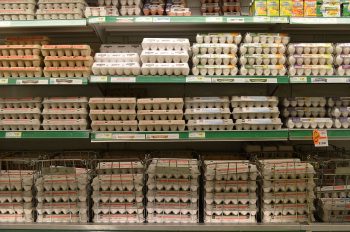Types of Eggs
Now when we go into a supermarket and buy our eggs, we’re greeted with quite a range of names – Farm Fresh Eggs, Free Range Eggs, Barn Eggs etc. But what do those egg descriptions really mean? Which types of eggs should we buy? How true are those egg descriptions?
British farmers produce around 9 billion eggs a year and we import a further billion from Europe. That’s 10 billion a year or 28,000,000 a day! About half of those eggs are sold in the stores with the other half being used in the catering industry.
Farm Fresh Eggs
So, you think of hens happily scratching around the farmyard as a ruddy faced, rustic farmer’s wife collects some eggs from a ramshackle hen house? Think again. A farm, in this context, means a huge pre-fabricated shed. An industrial unit. Fresh means less than 21 days old. Eggs is eggs, however.
Farm Fresh Eggs are produced by caged hens. It’s just a very clever marketing con term. Over 60% off all eggs consumed in the UK still come from battery units. Often you eat eggs from caged birds without knowing it, for example most cheap mayonnaise is made using cage produced eggs. The misshaped eggs etc that won’t meet grading standards for retail sale end up in the catering industry – often being pasteurised and processed to increase storage life.
Your caged hens live their entire short and wretched lives on a wire mesh floor in racks with space per hen slightly larger than a piece of A4 paper. Technically these are described as enriched cages. These provide a minimum of 750 cm2 per bird, along with a nest, perching space at 15cm/bird and a scratching area. Hardly luxury or allowing them to really express their nature.
Barn Eggs
Now we think of those barns of yesteryear (picked up the trend yet?, traditional = good in food marketing) with some hens wandering around, safe from the weather and fox. Oh dear, it’s not quite so wonderful.
Our barn is yet another industrial unit housing thousands but the hens do have the benefit of different levels, perching space and nesting boxes. 1 nest box per 7 hens who are crammed in at 9 per square metre. One and three quarters of a sheet of A4 paper per hen. Luxury?
 Free Range Eggs
Free Range Eggs
Now we’re talking, surely? These are the hens who wander into the country lane with no knowledge of fear of cars? Sorry, wrong again. Once again we’re talking about an industrial unit house but, and this is lots better, with access to a fenced off area outside. Although the stocking density is limited to 2,500 birds per hectare (that’s about 64 sheets of A4 paper per hen) most birds will hang around the shed if they do go out.
Hens are flocking birds, they tend to stick together as you’ll have seen if you watch backyard hens in a garden. This means the area around the shed becomes stripped of vegetation and a dustbowl. Our free range hens have the benefit in principle but the sheer numbers and their nature mean they really can’t take much advantage of their undoubtedly better conditions.
Organic Eggs
Organic eggs are simply those from hens kept in a free range system but fed only on organic food, ranging on organic land and they must not be fed growth-promoting antibiotics. The Soil Association organic standards are higher than the basic UK organic standards and stock density is limited to 1000 per hectare.
Conclusion – What Types of Eggs to Buy?
It’s really rather simple, organic eggs are best, free range second followed by barn eggs. Please, vote with your purse and don’t buy eggs from caged birds. However, if you want eggs from hens kept as you would like them to be, you have two real options.
- Keep your own hens – this way you know their conditions.
- Buy off small suppliers at the farm gate who are happy to show you their hens. Just up the road from us we can buy free range eggs at a price around or even lower than the supermarket. We know they’re free range because the small flock are wandering around.
Further Articles All About Eggs
- Araucana Egg Shell Colour & Genetics
- Build Your Own Artificial Lighting System for Winter Egg Production
- Changing Egg Yolk Colour with Feeding
- Double Yolk Eggs – What Causes Double Yolk Eggs?
- Egg Shell Colour Chart by Breed of Hen
- Egg Structure – The Structure of an Egg
- Eggs from Different Species
- Know Your Eggs? – Egg Descriptions Explained
- Marketing Your Surplus Eggs – How to Sell Your Eggs
- Nutritional Value of Eggs – Are Free Range Eggs Better for You?
- Pale Eggs – Egg Shell Colour
- Problems With Eggs – Yolks & Whites
- Saving Money – Economics of Home Produced Eggs
- Selling Your Surplus Eggs at Markets
- Selling Your Surplus Eggs from Home – Farm Gate Egg Sales
- Thin Eggshells – Causes & Cures
- What to do with Surplus Eggs? How to Store Eggs


